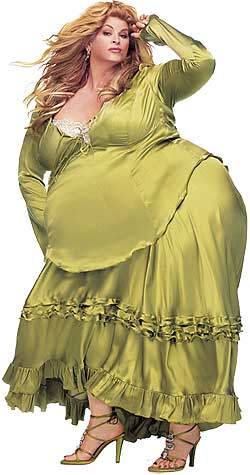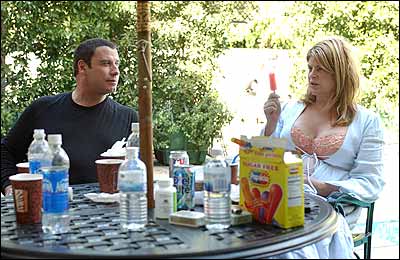
“You’re too fat to fuck.”
So begins the first chapter of Judith Moore’s Fat Girl. It’s something a man Moore had hopes for said to her at dinner after too many drinks. Reading it plunged me into an angry fantasy of being in Moore’s place, leaping out of her chair and beating the guy senseless. Moore does something better: She dumps him. He gets his nasty little strut upon the stage, and then he gets the hook. It’s a rare, satisfying moment in Moore’s memoir because it’s one of the few that feels like payback for the endless insults she has had to endure.
By contrast, payback is the animating spirit of Fat Actress, the Showtime series in which Cheers veteran Kirstie Alley tries to turn the 70-plus pounds she says she gained as a stay-at-home mom into show-business gold. The show tends to lurch wildly from scabrous satire of upscale Hollywood life to heavy-handed displays of forced whimsy. But its reliable center is Alley, an unabashed woman of appetites, clamoring for sex, love, and work, halfheartedly griping about her weight when she’s not voluptuously chowing down. Most often tricked out in dramatically flared satin negligees with underwire lace bra-tops, her hillock breasts and nana hips are a riveting, rude retort to the Prada-clad starvelings crowding up the rest of the channels. It’s hard to say how long this will last, since, in a spectacular act of having it both ways, Alley is flaunting her fat onscreen while shedding it as fast as she can as a spokeswoman for the Jenny Craig weight-loss program.
Unimaginable a decade ago, Fat Actress and the tamer network sitcom Less Than Perfect get on the air for the same reason books such as Fat Girl get published: because they’re marketable as never before. Call it fat chic—not that being fat has become chic (fat chance), but talking about it has. The current land rush in fat confessionals includes fairly slight works of comic riffing (Wendy McClure’s I’m Not the New Me), nonfiction anthologies that encompass the provocative and serious (Scoot Over, Skinny, edited by Donna Jarrell and Ira Sukrungruang), and pretty much everything in between.
And then there’s Alley, who, to my amazement, turns out to be right up mine. Alley has just published How to Lose Your Ass and Regain Your Life as a breathlessly timed effort to cash in on her new cable notoriety. It’s everything Fat Girl isn’t—written on the fly, padded with photographs, nearly devoid of literary merit, and often hilarious when it’s not being inspirational. Merciless is her middle name. Just ask former fling Tim Matheson, whose cheating ways get a shellacking in the book’s funniest chapter. Yet Alley and Moore mirror each other in interesting ways. Both like to get right up in your face, letting it all hang out (or trying to), and they aren’t afraid to offend. “I will not endear myself,” Moore writes. “I am not that pleasant.”
Alley’s hillock breasts and nana hips are a riveting retort to the Prada-clad starvelings crowding up the rest of the channels.
Alley and Moore are two sides of the confessional coin, although only one of the women has been greeted with universal praise. Not surprisingly, it’s the one who suffers. Fat Girl is a bitterly eloquent book. Moore had a pair of storybook villains in her life—an abusive, sadistic mother and a brutish hag of a granny straight from the brothers Grimm. But she saves most of her harshness for herself. Her husbands left her? How could they not? “I wasn’t easily affectionate … I was a lousy lay.” She refers frequently to her fat-related ugliness—nowhere evident in her author photo—saying at one point, “I hate myself because I am not beautiful.” Statements like this suggest a prom queen with a pimple, not a sophisticated writer with a Guggenheim under her belt. Her denunciations of her pendulous belly, her “pig’s eyes with Mongoloid flaps,” and her supposedly meaty smell outstrip even the meanest frat-boy insults.

John Travolta and Kirstie Alley. Photograph courtesy of Showtime.
Moore often uses animal imagery—fat pigs, ravenous wolves—to describe both her appearance and her appetite; at one point, she quotes her mother complaining, “You’re going to eat me alive!” Women and weight evoke issues of the power and control of appetite—which is why, for instance, the slang for a sexually powerful woman is man-eater. (There is no such fearsome term for randy men; the closest we come is the quaint lady-killer or the swashbuckling swordsman.) Anorexic women exercise the ultimate control over appetite: They starve, and it makes them feel powerful. The power of no. The rejection of need and desire. They are the ultimate refuseniks, saying no to life itself. But first they say no to the burden of femaleness—gone are the round breasts and buttocks, the feminine belly, the capacity to bleed and reproduce. They stand on the other side of our anxious contempt for fat people—they’re boygirls, at once haunting and desirable. We envy the thin and the fit because we think they have a control we lack and may never achieve. But if they go too far, we blame them, too.
In the battle of the big babe versus the anorexic boygirl, women can’t win for losing. In one of the strongest passages in Fat Girl, Moore fuses the emotional and physical hungers, grinding and voracious, that impelled her when young to slip into the empty houses of people who had shown her kindness and touch their things and eat their food. In doing so, she defines not just her own fat-fear and loathing, but the culture’s: “I believed that inside every fat person was a hole the size of the world; I believed that every fat person wanted to fill that hole by eating the world. It wasn’t enough to eat food. You had to swallow air, you had to chew up everyone who got near you. No wonder, I thought, that nobody liked me or liked me all that much.”
Alley’s lusty, vulgar exuberance feels like the antidote to Fat Girl’s pain. Fat Actress is a revenge comedy, which is why satire suits it and whimsy doesn’t. The form has antecedents—just about everything Mae West did, for example. Alley’s pleasure in such comical sex objects as the willowy Kid Rock is positively Westian, a tasty joke for women of size. One of the pleasures of the show is its acknowledgment of the fear and hostility a big woman attracts. Men—and women—who mock Alley’s capacious curves invariably look like jerks. But the most eloquent, impudent image of this fat actress doesn’t appear onscreen. In the outsize, eye-popping PR booklet for the show, there’s a two-page spread of the negligee-clad Alley draped across a couch and giving the camera her best smolder. A pair of pin-striped legs sticking out below and a similarly clad arm beneath each of hers are the only clues that under all that satin amplitude is a sharp-dressed man in a power suit, totally squashed.